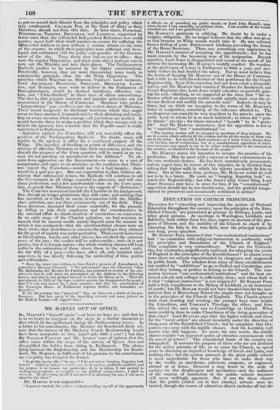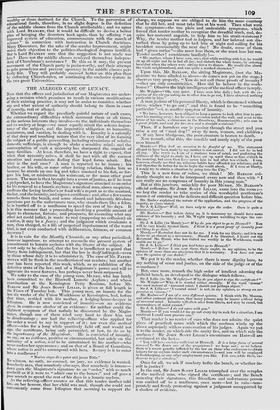EDUCATION ON CHURCH PRINCIPLES.
MEASURES for " extending and improving the system of National Education throughout the country, upon the principles of the Esta- blished Church," are patronized at present by Bishops, Lords, and other great persons. At meetings in Warrington, Lichfield, and Salisbury, held within these few days, regret on account of the pro. gress of Dissent, and the inability of the Church to check it by educating the laity in the true fitith, were the principal topics of very long, prosy speeches. Sir ROBERT PEEL lamented that "our ecclesiastical institutions" had " no connexion with religious instruction in conformity with the principles and formularies of the Church of England." This complaint is very extraordinary. What are the Universi- ties, but seminaries, magnificently endowed, for educating the youth of England in the principles of the Establishment? In almost every town there are schools superintended by clergymen and supported - by public funds. The scholars front many of these establishments are enabled by "exhibitions" to go to Oxford and Cambridge, pro- vided they belong, or profess to belong, to the Church. The con- nexion between "our ecclesiastical institutions" and the best en- dowed schools and colleges is sufficiently close; and whose fault is it that "religious instruction" is not imparted ? Sir ROBERT PEEL paid a high compliment to the Bishop of' Lichfield, as an instructor of youths; but Dr. BUTLER would not have thanked him for the insi- nuation that at Shrewsbury School the pupils were not brought up. in the priuciples of the Church of England. The Church prayers were read morning and evening; the younger boys were taught the Catechism, and TOMLINE'S Theology the elder; and front this school the next step was to Cambridge or Oxford. What more could be done to make Churchmen of the rising generation of that class? Lord STANLEY says that the higher schools and those for time "lower orders" are almost invariably under the direction of clergymen of the Established Church ; but he complains that Dis- senters run away with the middle classes. And his Lordship well knows why this happens. To quote his own words, the middle classes require "an improved 8.ys1ent qf education commensurate with Site march ed science." The educational fonds of the country are misapplied. It answers the purpose of those who are not destined
for the active pursuits of life, or to enter the Church, to spend years in obtaining an imperfect knowledge of Greek and Latin, and nothing else ; but the system pursued at the great public schools is most unprofitable for those who have to make their way in the world, as merchants, solicitors, surgeons, or engineers, abroad or at home. Descend a step lower in the scale of society—to the shopkeepers and mechanics—and the unfitness of the routine of instruction at the public schools becomes still more strikingly apparent. But it was for these classes that time public (which are in fact charity) schools were in- tended, though the course of education almost excludes all but the
wealthy or those destined for the Church. To the perversion of educational funds, 'therefore, in no slight degree is the defection of the middle classes from the Church attributable ; and we agree with Lord Swami., that it would be difficult to devise a better plan of bringing the deserters back again, than by offering "an improved system of education, commensurate with the march of science" in connexion with instruction in Church doctrines. Many Dissenters, for the sake of the secular improvement, might waive their objection to the politico-theological dogmas instilled. But is Lord STANLEY sure that the suggestion is not made too late? Have not the middle classes rendered themselves indepen- dent of Churchmen's assistance ? Be this as it may, the present movement of the Church party is praiseworthy, and their attempt to gain proselytes and prevent apostacy in the middle classes per- fectly fair. They will probably succeed better on this plan than by enforcing Church-rates, or continuing the exclusive system in the two great Universities.



























 Previous page
Previous page